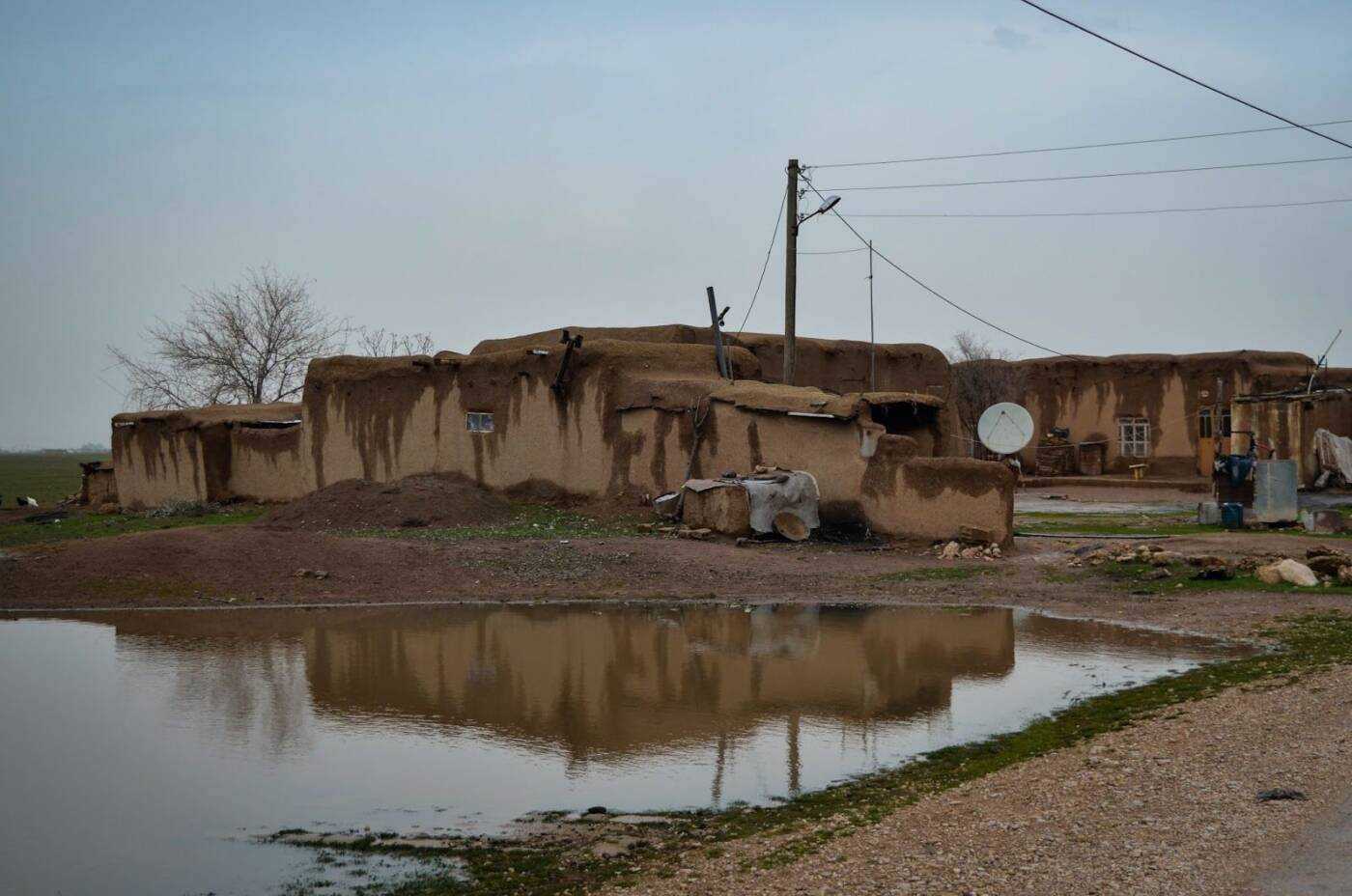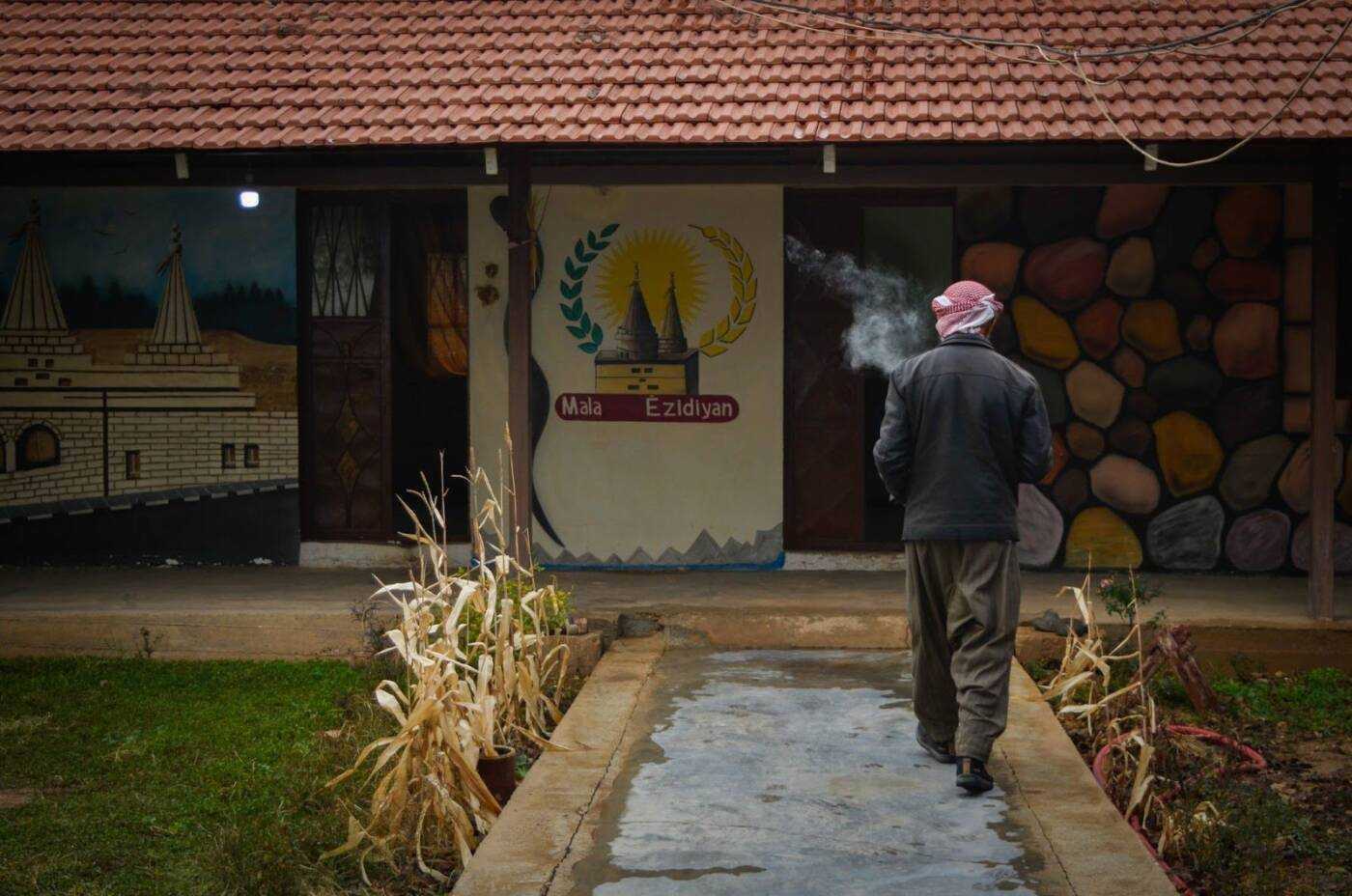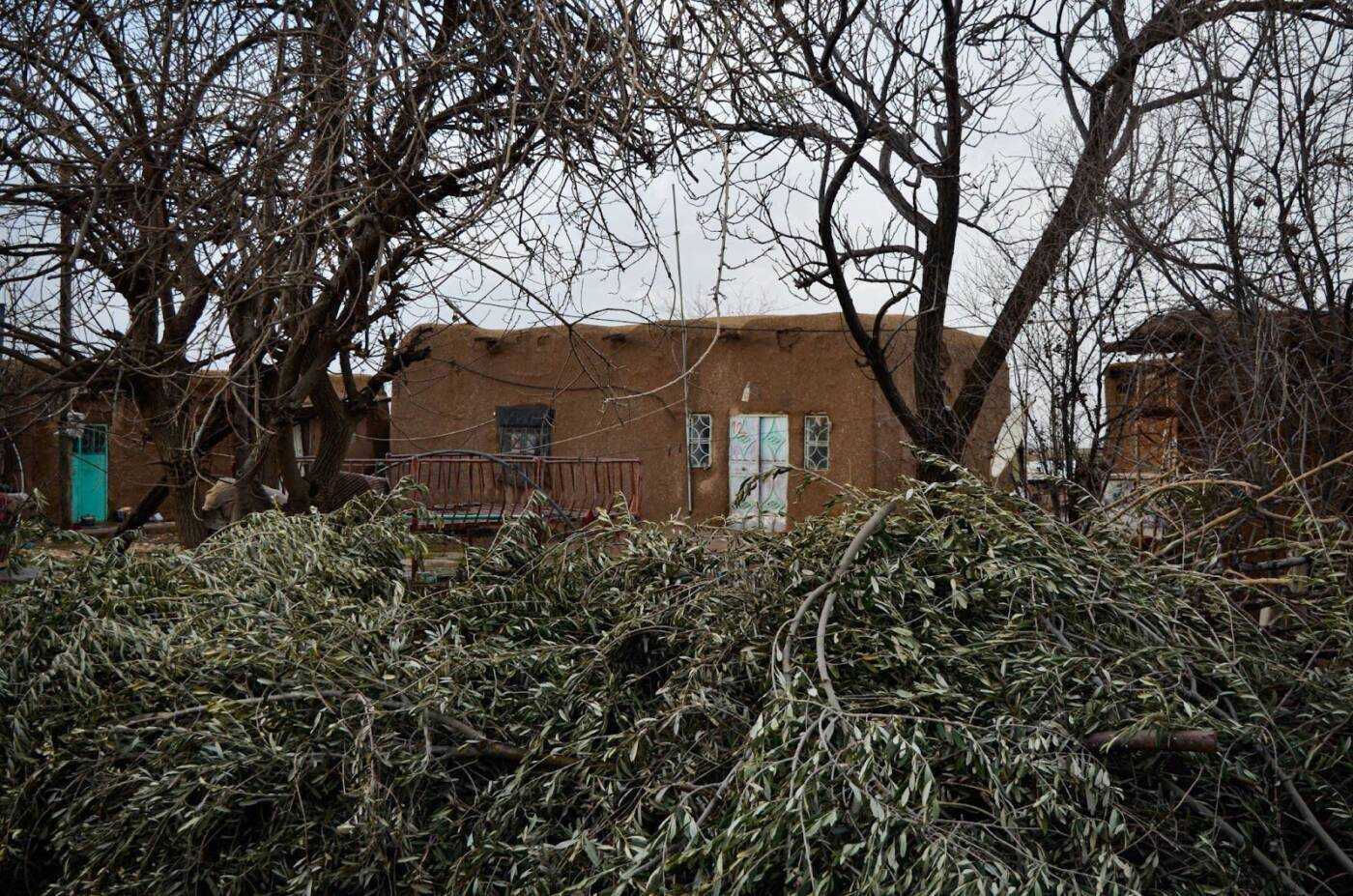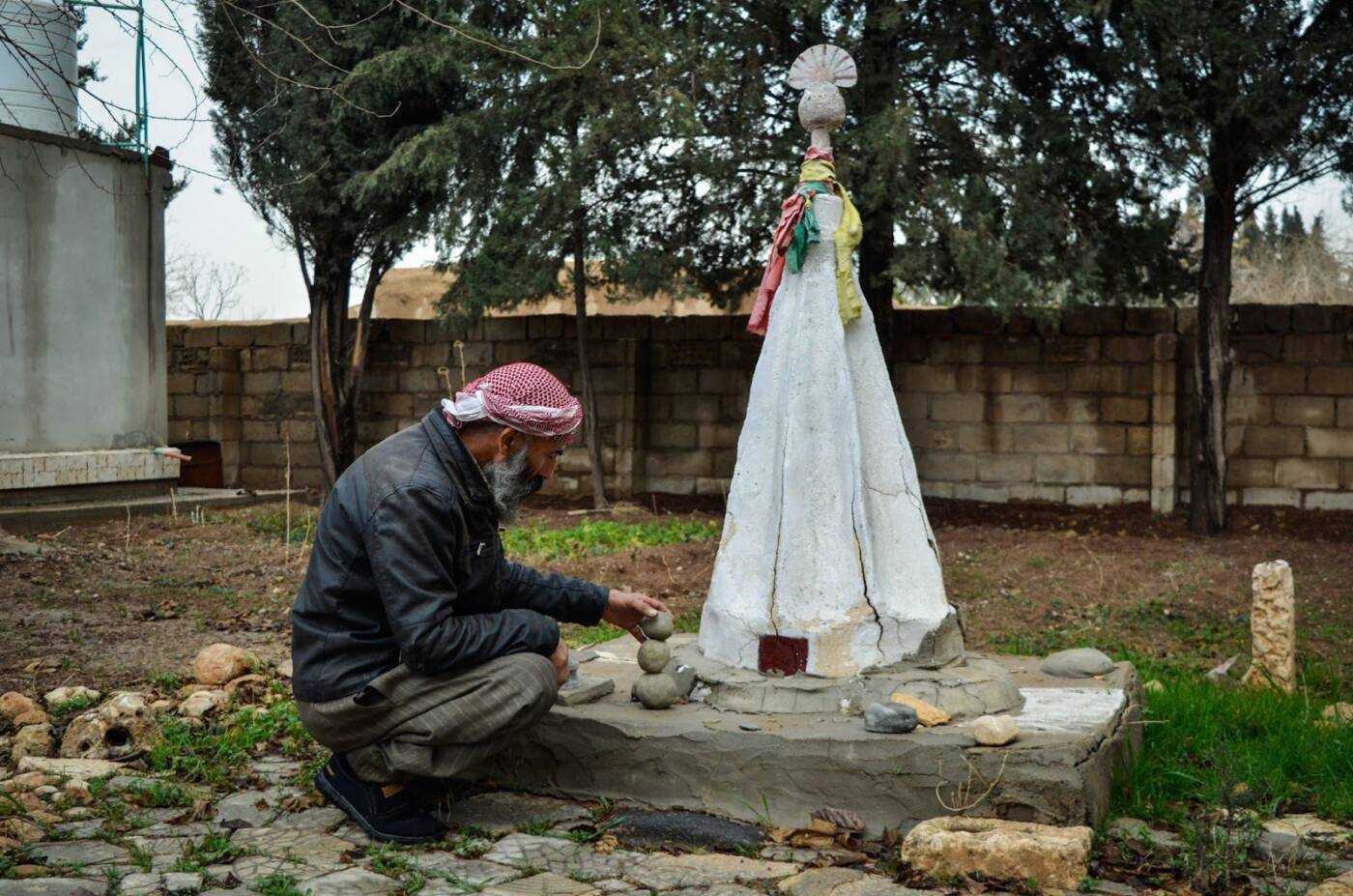Yazidis’ long struggle against landlessness and discrimination in rural Hasakah
Despite legal advances for religious minorities in AANES-controlled regions in recent years, most Yazidis in Hasakah province are still landless peasants with no formal rights over the houses and villages they built.
4 April 2023
QAZLACHOKH — With its low-lying mud houses surrounded by flat expanses of sprouting wheat, Qazlachokh looks like any other village in the countryside of Amuda, a town deep in Syria’s northeastern Hasakah province. But here and there, the thin mauve veils covering the heads of several women signal that this is not a typical Kurdish village, where women commonly wear long black scarves dotted with colorful splashes of yellow, white and red.
The residents of Qazlachokh are Yazidis, members of a religious minority that historically inhabit swathes of present-day Iraq, Iran, Turkey and Syria mostly populated by Kurds. Because they speak Kurmanji, a dialect of Kurdish, Yazidis are often considered to be Kurds, although some consider themselves a separate community.
Like many other religious and ethnic minorities in northeastern Syria, Yazidis were subjected to decades of discriminatory policies under the Baath Party in Syria, including barriers to education and employment, and difficulties buying and registering property in their name.
Long before the 2011 revolution, this lack of rights and economic opportunities pushed many Yazidis to emigrate. Today, the Yazidi House—an umbrella organization defending the rights of Yazidis in northeastern Syria—estimates that 15,000 Yazidis remain in Syria, including around 7,000 in Hasakah province, down from a peak of 100,000 in the 1990s.
Emigration reached an unprecedented peak in the mid-2010s following massacres carried out by the Islamic State (IS) organization in Syria and Iraq against Yazidis. More than 1,200 Yazidis were killed and more than 7,000 abducted and enslaved by IS from 2014 onwards. Most of the 550,000 Yazidis who once lived in northern Iraq were displaced from their homes. And in the Syrian district of Afrin—home to the bulk of Syria’s Yazidi community before the war— tens of thousands of Yazidis were also displaced in 2018 when Turkish-backed opposition factions seized the area.
By contrast, the Yazidi villages of Hasakah province were relatively spared during the war, and remained mostly out of the reach of IS. But 10 years after the near-total withdrawal of the Syrian regime from Hasakah province, many Yazidis still lack any rights over the houses, land and villages they have inhabited for centuries. And after decades of discrimination that prevented thousands from accessing education and job opportunities, much work remains to improve individual access to property rights.

The village of Qazlachokh, in Syria’s northeastern Hasakah province, 6/2/2023 (Lyse Mauvais/Syria Direct)
A feudal society
Sitting on the carpeted floor of his sparsely furnished house, Salah Sliman Khadr, a Yazidi farmer in his forties, tried to unravel the memories and stories he heard as a child about the genesis of his native village, Qazlachokh. Speaking shyly at first, he recalled that his ancestors arrived in northern Syria around 150 years ago, fleeing religious persecution in present-day southern Turkey.
In Syria, Khadr’s great-grandfather and relatives settled on the first available land they found, which they bought from a Christian landowner. “Everything was done legally, the transaction was registered with the authorities and my great-grandfather Molham had all the necessary documents to prove his ownership,” Khadr said.
But after Molham died, a feud erupted between his sons over inheritance. Decades later, the details of this dispute are vague in Khadr’s memory, but he believes his grandfather and great-uncle sold their respective shares to another wealthy Yazidi man in Qazlachokh, who became the mukhtar—the administrative chief of the village—by virtue of owning most of the land.
From that point on, Khadr’s grandfather and his descendants became landless peasants. They continued farming their fields, but had to give a share of the harvest every year to the mukhtar in return. Today, most residents of Qazlachokh are in the same situation, farming land that belongs to one family: the direct relatives of the mukhtar, who passed away some years ago.
“The people living in this village are all our workers,” one of the sons of the deceased mukhtar told Syria Direct, asking to remain anonymous to preserve his privacy. “The land around the village is registered under our name in the cadaster.”
Far from being an anomaly, this pyramidal economic structure, with a majority of landless peasants farming land belonging to a single family, is still common in many Yazidi communities. In part, it is the legacy of a traditionally feudal society, divided into three separate castes: religious leaders, political leaders and commoners. Although this rigid caste system is gradually falling out of use, it remains prevalent in rural areas and continues to perpetuate inequalities within the community.
“After the emergence of the modern Syrian state, those among the Yazidis who obtained legal rights over the land were practically all mukhtars or aghas [an honorific title awarded to civil and military leaders under the Ottoman Empire],” Elias Saydo, a member of the Administrative Council of Yazidi House, told Syria Direct. “This is because as political leaders they had direct interactions with the state, so they were better able to get their rights recognized.”
A host of property issues
Under the Baath regime, which took power in 1963, Yazidis and Kurds were generally considered second-class citizens in Syria. “They were forced to learn Arabic and Islam in school, and the Yazidi faith was not recognized,” Saydo said.
“Many of those who attended school would never reach the end of high school, and those who did never received diplomas, so they were unable to apply for jobs in offices and the administration,” Khadr recalled.
Multiple layers of structural discrimination made many Yazidis even more dependent on farming. In turn, this reliance tied them more closely to the local elites who controlled the land and the right to farm it.
But the biggest blow to Kurds’ rights, including Yazidis, took place shortly before the Baath party rose to power. In 1962, the then-governor of Hasakah province ordered an express census that officially aimed to counter the flow of Kurdish migrants settling in Syria from Turkey. Residents were given one day to prove they lived in Syria before 1945, or be stripped of their nationality. The census deprived an estimated 120,000 Kurds of citizenship.
Now stateless, they could no longer own property or businesses, travel, work in the public sector or earn university degrees. Thousands had to register their properties under the name of relatives, friends or neighbors. But this solution left them vulnerable to extortion and abuse, since those who had lent their names could officially claim ownership of the properties any day. Many Yazidis were also impacted by this situation, and although most residents of Qazlachokh did manage to prove their Syrian citizenship, two families in the village were made stateless.
Read more: ‘There is no future for us in Iraq either’: Statelessness plagues Syrian Kurdish refugees
Over time, the education and literacy gap between those who had citizenship and the stateless, as well as between local elites and commoners, widened. As a result, many of Qazlachokh’s residents still have practically no rights over the land they farm and the houses they built.

The Yazidi House (Mala Êzdiyan in Kurmanji), based in Syria’s northeastern Hasakah province, is an umbrella organization protecting Yazidi culture and rights, 6/2/2023 (Lyse Mauvais/Syria Direct)
“We are still the slaves of the mukhtar,” Khadr’s 80-year old father told Syria Direct. “I’ve been living in this village since I was born, and farming there for almost as long, but I still don’t own a single plot of land.”
When the mukhtar passed away, his 3,000 dunums (300 hectares) of farmland went to seven of his direct relatives, along with the land on which the village was built. So although everyone in the village considers the houses to belong to the various families who live in them, virtually no one has documents proving ownership, which means they could be expelled overnight if their landowner chose to do so or sold the land to someone else.
“Because most Yazidis are still landless peasants, they can’t drill a well on their land, sell it or rent it, and when a family leaves, the plot they used to farm goes back to the landowner,” Saydo said. Agriculture in Hasakah is predominantly rainfed, but farmers increasingly rely on wells for irrigation as rainfall has become less reliable in recent years. And because local authorities only give subsidized seeds and fuel to farmers who have irrigated land, those like Khadr who rely on rain receive much less support than landowning farmers.
10 years of autonomous rule
In 2013, the Syrian regime gradually withdrew from most of Hasakah province, focusing its troops in other parts of the country to fight armed opposition factions following the 2011 revolution. Across the province, most of the institutions it left behind were quickly taken over by a Kurdish-led coalition of Kurdish, Arab, Assyrian and Syriac parties, who established a de facto government to administer the territories under their control. Known as the Autonomous Administration of North and East Syria (AANES) since 2018, it now controls most of northeastern Syria.
The new multi-ethnic coalition quickly took measures to end formal discrimination against several minorities in northeast Syria, including Yazidis and Assyrians. Aramaic and Kurdish were recognized as official languages alongside Arabic, and the Yazidi faith was formally recognized as a religion. Yazidis, in Saydo’s view, could “breathe for the first time in decades.”

A mud and hay house in the Yazidi village of Qazlachokh, in the countryside of Amuda in northeastern Syria, 6/2/2023 (Lyse Mauvais/Syria Direct)
But these nominal measures could not erase decades of deeply entrenched inequalities overnight, and little has changed for the residents of Qazlachokh in terms of property rights.
Most residents are still unsure what rights—if any—they can claim over their houses, and they find the prospect of entering administrative and legal processes daunting. “If I want to register my house tomorrow, where do I need to go? What do I need to do? Who should I speak to?” Khadr asked. “I don’t know. I think the authorities should visit our villages and register our houses for us, because we don’t know how to do it.”
Prior to 2013, since Yazidis knew they would not be able to register houses in their names or get the required building permits from the state security services, most people built their houses informally, without permits and property deeds, out of cheap and locally available materials like mud rather than pricier concrete and bricks. They expected the Syrian state to turn a blind eye, since practically all houses in rural areas were built this way.
Today, this culture of informality persists and many do not see the point of registering their properties. “We never thought of properly registering these houses in the cadaster,” the mukhtar’s son said. “This is how it’s always worked in rural areas, houses are built informally from the start and then they never get registered. No one has asked us to register them, and we’re not worried anyone will ask.”
Likewise, land is still concentrated in the hands of a small elite, although the population of the village dwindled after the war from 25 to 14 households. “Nothing has changed for us. People left, but the land they used to farm went back to the mukhtar’s family,” Khadr said.
And despite his family’s sustained presence in the village for more than three generations, Khadr is acutely aware that his ties to the land are tenuous at best. “Having rights over this land is very important for me, for the future of my children,” he said. “We have always been farming this land, and it would be good if it legally became ours.”







